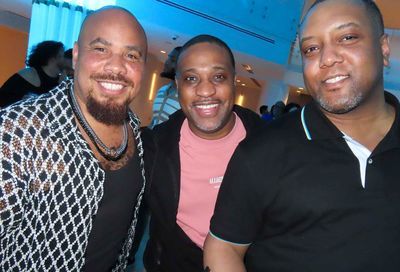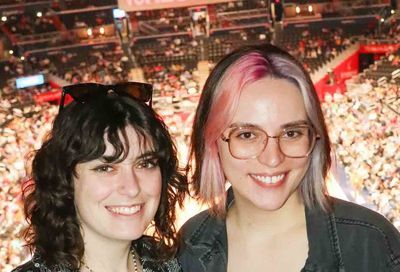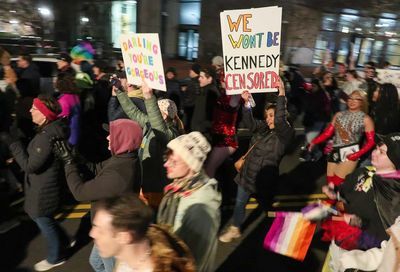Center for Black Equity Launches Vaccine Education Campaign
Initiative seeks to educate communities of color about monkeypox virus and instruct people on how to access the vaccine.

The Center for Black Equity has partnered with Gilead Sciences, Inc. as part of a new initiative aimed at increasing monkeypox virus, or MPV, vaccination rates among LGBTQ communities of color.
Utilizing the Center for Black Equity’s ongoing partnerships and the support of the International Black Pride Membership Network, the funding will be used to educate people about MPV and MPV vaccinations by providing accurate, reliable information about the disease, how to prevent it, and provide a guide that will instruct individuals on when and how to get vaccinated in their local communities, including state-by-state information on any supporting documentation or proof of identity they need to take with them to their appointments. The program will also address stigma surrounding MPV and encourage people to pursue testing and vaccination if they are at risk of contracting the virus.
“When the outbreak first occurred, we talked about the disparity between the number of infections and the number of people getting the vaccine, and it was very reminiscent of what happened with COVID-19,” says Kenya Hutton, the deputy director for the Center for Black Equity, referring to COVID-19 vaccination rates among Black people that continue to lag behind vaccination rates among white people.
“So, the Center for Black Equity chose to get ahead of what we saw was happening and try to create systems or a program that will increase Black and Latinx LGBTQ communities’ access to vaccines, not just in D.C. but nationally, as well as increase information about MPV,” he adds.
Hutton says the initiative is intended to be grassroots-based, incorporating input from communities as to what services, resources, or funding local Pride networks need at their disposal to educate LGBTQ people of color about MPV and connect as many as possible to vaccine clinics.
“If they need more funding, we’ll start to research funding opportunities so they can execute and do things they want. We’ve had a request for culturally appropriate materials that reflect the community, so we’re going to be working on some of those materials, commercials, public service announcements, anything to help push the information out there to the community,” says Hutton.
To assist individuals in navigating the vaccination process, the Center for Black Equity will be linking to a portal from its website, which will allow people to type in their zip code and be provided with information about local clinics they can access, and what documentation they’ll have to bring along with them to receive a shot. Center for Black Equity staffers will be making calls to individual states to provide detailed information about each individual state’s requirements and the process involved in making an appointment.
“We’re trying to get rid of all the barriers that individuals, wherever you are, so that if you are interested in getting an MPV vaccine, you can go right to our website, put in your your your zip code, and we’ll find a location near you,” says Hutton.
“We’re really going to try to streamline the process and comb through a lot of noise. So when people type in their zip code, they’re going to get exactly what they need to have and know exactly where to go to get those vaccines, instead of having to call three or four different numbers,” he adds. “By the time that information makes it onto our website, it’s going to be super clear, super transparent, and super easy to follow for anyone who wants to get a shot.”
Gilead Sciences previously announced in August it would provide up to $5 million in global grant funding to support MPV education campaigns and messaging geared towards vaccine-hesitant people, with its Global Monkeypox Outbreak Emergency Fund providing grants of up to $50,000 to organizations working to combat the spread of MPV. It also announced partnerships with GLAAD, the Human Rights Campaign, the National Black Justice Coalition, and the National Center for Lesbian Rights to outreach to at-risk communities and educate LGBTQ people on how to protect themselves from the virus.
Hutton says Gilead’s partnership with the Center for Black Equity continues that focus on health equity, allowing community leaders to leverage funding to reach individuals who are not closely following traditional sources of information or are not hearing much about MPV and prevention in their own social circles.
Asked about the substantial amount of vaccine hesitancy among communities of color, Hutton critiqued the way the medical establishment approaches public health, which can serve as a deterrent for some people.
“I spoke with a cisgender heterosexual woman, and her issue was that some of the questions they ask on the vaccination form were very intrusive,” notes Hutton. “I know someone else who said they don’t want to be seen going into a clinic with signs advertising the “monkeypox” name and the stigma surrounding the virus. One of the biggest things I’ve hear people complain about is the level of personal information that have to give. They’re concerned about how this information is going to show up, and is it going to come back to bite them.”
Hutton noted that some people, especially those who don’t get their news from traditional media sources or government health agency websites, also don’t know where clinics are located. He also said that some degree of vaccine fatigue, especially after the COVID-19 pandemic, which saw some individuals receive up to three different vaccines, may be exacerbating hesitancy.
“When I got my shot and posted a picture online, a lot of people said, ‘Oh my god, we have to get another shot,'” says Hutton. “People are tired of vaccines. So some people are hedging their bets and saying, ‘Well, maybe I won’t get it.’ They don’t think it’s necessary. They don’t think they’re at risk, because they don’t know how transmissible MPV is.
“There are some who don’t fall into any of the categories that were first touted when the outbreak began, like gay men who are on hookup apps or going to bathhouses, but we have to remember that the information that came out first is the information people tend to remember. So we have to let people know that anybody in the community can contract MPV,” he adds.
“Then some people have never heard of monkeypox and think the vaccine is new, that it just came out. They don’t know the vaccine has been around for years, we just didn’t need it until now,” says Hutton. “So the education piece of this campaign is important to inform members of our community so they can make the best health decision for themselves based on facts.”
Support Metro Weekly’s Journalism
These are challenging times for news organizations. And yet it’s crucial we stay active and provide vital resources and information to both our local readers and the world. So won’t you please take a moment and consider supporting Metro Weekly with a membership? For as little as $5 a month, you can help ensure Metro Weekly magazine and MetroWeekly.com remain free, viable resources as we provide the best, most diverse, culturally-resonant LGBTQ coverage in both the D.C. region and around the world. Memberships come with exclusive perks and discounts, your own personal digital delivery of each week’s magazine (and an archive), access to our Member's Lounge when it launches this fall, and exclusive members-only items like Metro Weekly Membership Mugs and Tote Bags! Check out all our membership levels here and please join us today!





















You must be logged in to post a comment.